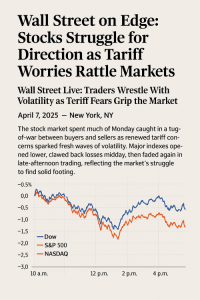US Government Debt: Can Wall Street Handle It? (Video)

Wall Street
Wall Street is starting to worry that it may not be able to handle all of the bonds that the US government is issuing. This is a significant problem, as the government is borrowing money at a record pace to finance its spending.
The concern is that the market for US Treasuries, which are considered to be the safest investment in the world, is becoming saturated. As a result, bond prices are falling and yields are rising. This is making it more expensive for the government to borrow money, and it is also hurting investors who own bonds.
There are a number of factors that are contributing to this problem. One is the Federal Reserve’s interest rate hikes. The Fed is raising rates in an effort to combat inflation, but this is also making bonds less attractive to investors. Another factor is the ongoing war in Ukraine, which is creating uncertainty in the global economy and leading investors to seek out safer investments.
The US government is expected to issue a record $1.8 trillion in new debt in 2023. This is a lot of debt to absorb, and it is putting a strain on the Treasury market.
If Wall Street is unable to handle all of the government’s debt, it could have a number of negative consequences. First, it could make it more expensive for the government to borrow money, which could lead to higher taxes or cuts to government programs. Second, it could hurt investors who own bonds, which could lead to a sell-off in the bond market. This could have a ripple effect throughout the financial system and could lead to a recession.
Potential Consequences of Wall Street Not Being Able to Handle All of Washington’s Bonds
- Higher interest rates: The government would have to offer higher interest rates on its bonds in order to attract buyers. This would make it more expensive for the government to borrow money, which would lead to higher taxes or cuts to government programs.
- Sell-off in the bond market: If investors start to sell off their bonds, it could lead to a sharp decline in bond prices and a rise in yields. This could have a ripple effect throughout the financial system and could lead to a recession.
- Loss of confidence in the US economy: If Wall Street is unable to handle all of the government’s debt, it could lead to a loss of confidence in the US economy. This could make it more difficult for US companies to raise capital and could lead to a slowdown in economic growth.
What the Government Can Do
The government can take a number of steps to address the problem of Wall Street being unable to handle all of its debt. One is to reduce its spending. This would help to reduce the amount of debt that the government needs to issue. Another option is to increase taxes. This would raise more revenue for the government and reduce the need to borrow money.
The government could also try to make its debt more attractive to investors. This could be done by offering higher interest rates or by issuing shorter-term bonds. The government could also try to diversify its investor base by selling more debt to foreign investors.
The problem of Wall Street being unable to handle all of Washington’s bonds is a serious one. It is important for the government to take steps to address this problem, as it could have a number of negative consequences for the economy.
Additional Thoughts
In addition to the potential consequences listed above, there are a number of other ways in which the US government’s debt could have a negative impact on the economy. For example, a large debt burden can lead to higher inflation, as the government has to print more money to pay off its debt. A large debt burden can also make it more difficult for the government to respond to economic shocks, such as a recession.
The US government has a long history of managing its debt responsibly, but the current situation is different. The government is borrowing money at a record pace, and the Federal Reserve is raising interest rates. This is making it more expensive for the government to borrow money, and it is also putting a strain on the Treasury market.
The government needs to take steps to address this problem. One way to do this is to reduce its spending. Another way is to increase taxes. The government could also try to make its debt more attractive to investors by offering higher interest rates or by issuing shorter-term bonds.
It is important to note that there is no easy solution to this problem. The government needs to weigh the costs and benefits of different options carefully. However, it is clear that the government needs to take action to address the problem of its growing debt burden.






